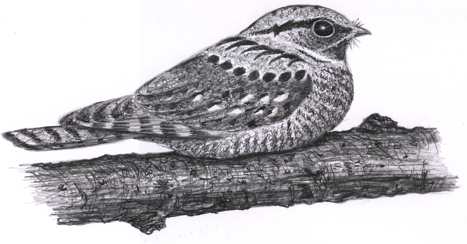
Dear Bird Folks:
It’s almost June and finally, for the first time all year, the weather is warm enough to sleep with the windows open. The fresh air was wonderful until I was awakened by the incessant call of a crazy bird that I’ve been told is a Whip-poor-will. This maniac bird sang long and loud all through the night. How much longer will this bird keep singing and how can I get it to shut-up?
-Terry, Wellfleet.
A Question For You Terry,
Are you related to my wife? You two have something in common. Before I moved to sterile East Orleans I used to live in an area that had Whip-poor-wills calling at night. When their calls woke me up at 3:00 AM I would sit up and smile. I would smile because I really enjoyed their crazy call. But what really made me smile was the sight of my wife putting a pillow over her head. Perhaps you two should start some kind of Whip-poor-will support group.
The Whip-poor-will’s name comes from its song. It says “Whip-poor-will” nonstop over and over and over. It is not unusual for the bird to repeat its name 100 times or more without a break. One guy, with not a lot to do, counted a bird yelling Whip-poor-will 1,088 times before the bird took a short break, perhaps for a throat lozenge.
Whip-poor-wills have just arrived from their southern wintering grounds and the males are calling in hopes of attracting a female, to stakeout a territory and to annoy you and my wife.
Whip-poor-wills are kind of a mystery bird. Even though they are around here all summer, few people get to hear them and fewer ever get to see them. Like bats, owls and 7-Eleven clerks, they are creatures of the night. They come out at dusk in search of flying insects. They catch moths, June bugs and lots of mosquitoes. After counting and analyzing stomach contents, it is believed that a Whip-poor-will eats more mosquitoes in one night than a Purple Martin eats in a life time. I’m not sure who counted all those half-digested mosquitoes, but I’m happy to take their word for it.
Unlike bats that use sonar to find insects in the dark or owls that often use hearing, Whip-poor-wills find food visually. Their eyes have a reflective layer in the back of the retina that helps amplify dim light by passing light through the retina a second time. They also have a mouth that is kind of freaky. When open, a Whip-poor-will’s bottom jaw changes from a “V” shape to a semi-circle to create a massive gaping mouth that makes it easier to scoop insects on the wing. Along the sides of their mouths they have stiff whisker-like bristles that may help funnel insects into their black hole sized mouths.
Believe it or not, the best time to see a Whip-poor-will is at night. Their cryptically colored gray-brown plumage makes them nearly impossible to find during the day. They often roost lengthwise on a tree branch with amazing stealth results. If you look for Whip-poor-wills at dusk or on a moonlit night you have a better chance to catch glimpses of them as they zip about chasing moths. Another way to find them is to shine a bright light down a quiet road or trail. Whip-poor-wills can often be seen sitting on the road. Their cryptic feathers still make them hard to find, but the reflective layer in their eyes shoots back a brilliant red glow that makes it appear that a devil is waiting for you if you continue down the road.
Whip-poor-wills should stop singing by July. In the meantime I think you should stop your whining and appreciate the sounds of one of the unique birds of nature, for this bird’s population is in decline. I say enjoy your Whip-poor-will, Terry, either that or borrow my wife’s pillow.